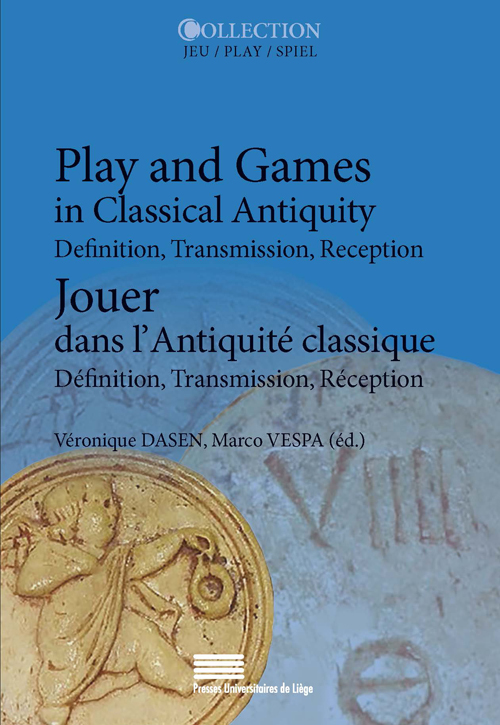Jouer dans l’Antiquité classique
28,50 €
Définition, Transmission, Réception
Play and Games in Classical Antiquity: Definition, Transmission, Reception
par Véronique Dasen, Marco Vespa (éds)
The European Research Council project (Locus Ludi. The Cultural Fabric of Play and Games in Classical Antiquity (ERC AdG # 741520) investigates how play and games provide a privileged access to past societal norms, values, identities, and collective imaginary. People play all over the world and throughout history, but they do not play the same games, nor do they attribute the same meaning and function to play. This pluridisciplinary volume investigates how such an important part of ancient cultures can be methodologically reconstructed. A first series of chapters based on Greek and Roman texts and vocabulary propose an emic definition of play and games. Beyond the common association of child and play (in Greek, paidia, ‘play’, pais, ‘child’, and paideia, ‘education’, share the same root, in Latin ludus means ‘play’, ‘school’, and ‘rethorical games’), ancient views are more complex and nuanced. The boundaries between sport, dance, rites and play are fluid and differ from our modern view. Case studies show how playful practices can be defined in material culture and iconographic representations. The second part of the volume focuses on Greek and Roman ludic heritage in ancient literature with particular attention to the cultural and discursive codes according to literary genre (oniromancy, proverbs, children’s rhymes, lexicography…). Close studies assess the transmission of a predominantly oral heritage in collections, lexicons and commentaries ranging from the Roman imperial period to Byzantine times (proverbs, riddles, and children’s lore). New insights are provided on crucial issues about cultural continuities and discontinuities, as well as the definition of so-called « traditional » games.
Véronique DASEN is professor of Classical archaeology at the University of Fribourg (CH), and specialised in ancient cultural anthropology and archaeology. She published extensively on the history of the body, childhood and gender, as well as on ancient medicine, magic, and play. She is the Principal Investigator of the ERC project Locus ludi.
Marco VESPA is a classical philologist and member of the ERC project Locus ludi at the University of Fribourg (CH). His research interests include the Second Sophistic, ancient Greek comic theatre, and the anthropological study of ancient Greek scientific texts. He has published extensively on Greek and Roman zoology and cultural representation of animals.
Informations complémentaires
| Tomaison | Jeu/Play/Spiel 2 |
|---|---|
| ISBN | 978-2-87562-288-4 |
| Année | 2021 |
| Pages | 518 |



